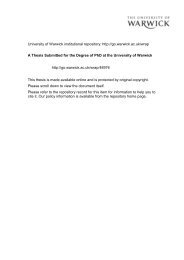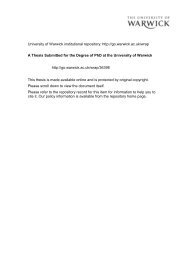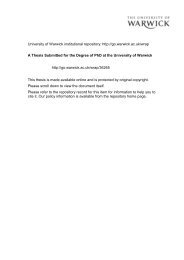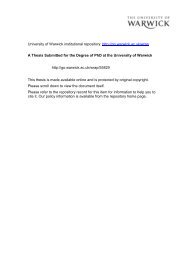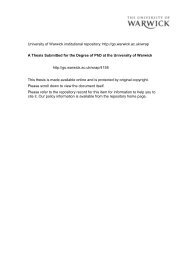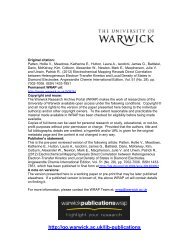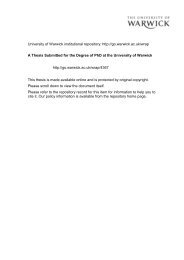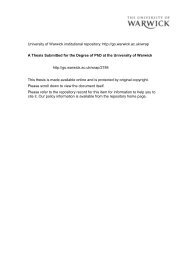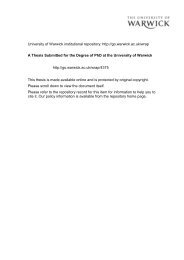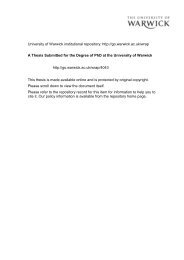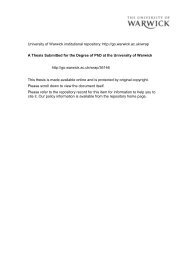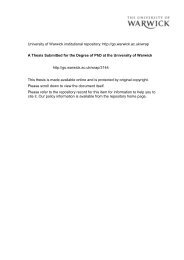Download (13Mb) - WRAP: Warwick Research Archive Portal ...
Download (13Mb) - WRAP: Warwick Research Archive Portal ...
Download (13Mb) - WRAP: Warwick Research Archive Portal ...
Create successful ePaper yourself
Turn your PDF publications into a flip-book with our unique Google optimized e-Paper software.
CHAPTER ONE<br />
An Italian space for the female fantastic<br />
i. Towards a spatial definition ofthe fantastic<br />
The complex knot oftheories which clouds and sometimes eclipses the literary<br />
term 'fantastic' is anticipated by, and in part results from, the simplest etymological<br />
analysis of the word. Its close links to the term 'fantasy' and 'fantasm' and its subtly<br />
different permutations and connections across different Indo-European languages<br />
inevitably blur perceptions of it as a distinct genre. 52 At the same time a more<br />
penetrative inquiry, such as that carried out by Giulio Lepschy, opens our eyes to the<br />
potential for the dense layering of signification which is also its most vital quality and<br />
which endows it with a seemingly inexhaustible vitality. S3 It is the very enigma ofthe<br />
word 'fantastic' which best defines its function on the contemporary literary scene, in<br />
the words of Secchieri 'un fenomeno cui sembra davvero attagliarsi l'ossimorica<br />
etichetta di "indefinibile per definizione.t'Y'Whilst this flexibility certainly sounds<br />
conducive to creative freedom, I will show that ultimately it is the distinctive mode of<br />
expression of this 'indefinibility', conveyed by Secchieri as peculiar to the fantastic,<br />
which holds the powerful attraction for the female writer rather than a sense that<br />
52 See, for example the distinction Halo Calvino makes in 'Defmizioni di territori: il fantastico', Una<br />
pietra sopra (Milan: Mondadori, 1995), pp.260-263. This article was originally published by Le<br />
Monde, 15 August 1970 as a series ofresponses to questions on the occasion ofTodorov's Introduction<br />
a la litterature fantastique. 'Nel linguaggio letterario francese attuale il termine fantastico e usato<br />
soprattutto per Ie storie di spavento, che irnplicano un rapporto col lettore alIa maniera ottocentesa: il<br />
lettore (se vuole partecipare al gioco, almena con una parte di se stesso) deve credere a cio che legge,<br />
accettare di essere colto da un'emozione quasi fisiologica (solitamente di terrore 0 angoscia) e cercarne<br />
una spiegazione, come per un'esperienza vissuta. In italiano (come originariamente anche in francese,<br />
credo) i termini fantasia e fantastico non irnplicano affatto questo tuffo del lettore nella corrente<br />
emozionale del testa; implicano al contrario una presa di distanza, una levitazione, l'accettazione<br />
d'un'altra logica che porta su altri oggetti e altri nessi da quelli dell'esperienza quotidiana (0 dalle<br />
convenzioni letterarie dominanti)' (p. 260) See also his introduction to Racconti fantastici<br />
dell'Ottocento in which he explains that 'L'uso italiano [contrasted with the French termfantastique]<br />
associa piu liberamente "fantastico" a "fantasia"; difatti noi parliamo di "fantastico ariostesco", mentre<br />
secondo la terminologia francese si dovrebbe dire "il meraviglioso ariostesco".' (p.6) Indeed, in the<br />
light of these considerations, in my provisional defmition of the fantastic I intend to refer as much as<br />
possible to contemporary Italian theoreticians of the term, although as we shall see many ofthem have<br />
been drawn closer to the French understanding than Calvino was.<br />
53 Giulio Lepschy, 'Aspetti linguistici del fantastico' in Nuovi saggi di /inguistica italiana, (Bologna: II<br />
mulino, 1989), pp.199-230. He writes: 'Attraverso la radice di fantasia ci siamo collegati alIa luce e alIa<br />
visione, al parlare e al linguaggio, non senza incontrare, lungo la via if falIo e it nome del padre: un<br />
vero paradiso lacaniano.' (p.20 1)<br />
54 Filippo Secchieri, 'II coltello di Lichtenberg: fantastico e teoria letteraria' in Geografia. storia e<br />
poetiche delfantastico ed. by Farnetti, pp. 145-164 (P145).<br />
21




